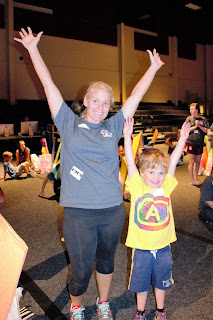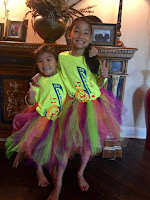Bryan's speech at this year's Nashville Congenital Heart Walk:
My oldest son, Ayden, who was born with a very serious congenital
heart defect called hypoplastic left heart syndrome, turned six in
April. A month later, he finished up his kindergarten year. A
kindergarten year in which his standardized test score was the highest
in his grade and ranked in the 99th percentile nationwide. A
kindergarten year in which a number of the school’s teachers were
shocked to find out about the seriousness of his defect, because it
didn’t match up with the child they saw five days a week for the better
part of nine months.
All of this from a kid who, once upon a
time, was being monitored for the presence of brain damage due to a
possible sustained loss of oxygen. So, I stand before you today to say
there is hope. But, buried somewhere underneath that hope, is dread.
A little over a year ago, Ayden played his first regular season of
baseball. He was in the younger half of the age range, so he was smaller
and slower than most of his teammates. (That, every time he hit the
ball, he laughed and smiled the whole way to first base didn’t help with
the speed part.) While he wasn’t the biggest or the fastest, or the
best or most talented, he was coachable. He got better as the season
went on, and his smiles and laughter while running to first slowly
turned into looks of determination to not make an out. His team did not
lose a game and, by the end of the season, Ayden was its regular lead
off hitter.
Baseball season overlapped with the lead up to last
year’s walk, which inevitably led to a number of the other parents
learning of his defect. This group included his coach, a man who, at the
post-season team party, broke down when talking about the impact Ayden
had had on him. I wish I could be more specific about what he said, but
the water quickly accumulating in my own eyes somehow made it hard for
me to catch everything.
All of this from a kid who needed hours upon
hours of therapies – physical, occupational, feeding – in order to be
TAUGHT how to roll over, sit up, crawl, stand, walk, jump. How to drink,
chew, swallow, use a cup, use a straw.
There is hope. And there is dread.
Just under four years ago, we turned Ayden over to a team of doctors
and nurses for the third and final planned stage of his heart repair. He
was a few months past his second birthday, and had been home from the
hospital for a little over a year and a half. We had no idea what to
expect. The first two surgeries had fallen on opposite ends of the
recovery spectrum. The months spent in and out of, but mostly in, the
hospital after the second surgery had been especially hard and
discouraging. For the third surgery, I was there with him for the
duration of his recovery. I did not go home until he did. It was the
saddest I had ever seen him. If it is possible for a two year old to be
depressed, that’s exactly what he was. I don’t think he smiled a single
time. To see the blank expression on his face was heart-wrenching. To
this day, I can close my eyes and hear how he screamed my name when he
would wake up in the middle of the night. Nevertheless, the surgery and
recovery went smoothly, and Ayden went home on the ninth day. That ninth
day in the hospital has been the last. Almost four years later, and he
has not been back.
All of this from a kid who spent most of the first eight months of his life in a hospital bed.
There’s hope. There’s dread.
Today is June 4, 2016. Almost exactly six years ago, on June 9, 2010,
Ayden came close to dying. I wish that was hyperbole. He’d had one foot
out the door for weeks, but there was a pesky arrhythmia issue we
couldn’t get figured out. Nothing the doctors tried had fixed it, and he
couldn’t go home until it was under control. He was stuck in a rut – a
rut that led him right off a cliff. He had become listless, and didn’t
even have enough energy to eat. An attempted blood draw to run some
tests was the final straw. He went totally white. His heart rate and
oxygen levels dropped precipitously. My wife went running into the hall,
screaming that we needed help. I backed away from his bed, and into the
knowledge that there was nothing I could do. Within moments, the room
was full of people. He was taken to the ICU, where he bottomed out
again. He received 48 minutes of CPR while he was connected to life
support. It is this episode which led to the concern about brain damage.
This episode which led to his need for therapies. Led to him having a
feeding tube past his second birthday. And, most significantly, led to
him becoming the success story that he is.
Hope. Dread.
Hope is found in where he is now. Dread lurks in the uncertainty around
how long he will stay there. You see, our bodies aren’t designed to
function on re-plumbed circulation like Ayden’s. His surgeries allow him
to live, but they are not a cure. No cure exists. He still has half of a
heart. The long term implications of this are, for the most part,
unknown. Doctors are just starting to scratch the surface of how other
parts of the body react over time to his abnormal circulation.
Complications can arise without warning. I have seen it happen too many
times in the lives of other children like him.
I dread the day
when he has a full understanding of his condition, and of his uncertain
future. Will he shy away from things the rest of us take for granted?
Will he hesitate to bring others into a life filled with so many known
unknowns? Will the fear of his own genetics keep him from knowing the
joy of being a husband? Or a father?
I stand here before you
today to say there is hope and dread. I believe that in order to
increase one, we must acknowledge the other. We must recognize the
dread. The fear. The pain. The danger. We must make others aware, not
just those of us who have been specifically touched by CHDs. As these
children grow into adults, increased understanding will be critical –
better surgeries, better medicines, better solutions are needed. We owe
them that. And this walk is part of it. All of you are a part.
Spread awareness. Embrace the dread. Increase the hope. Thank you.
































